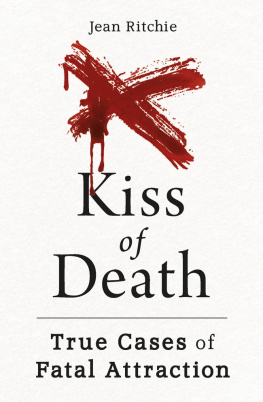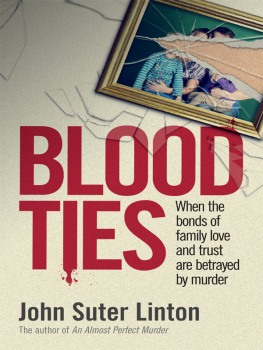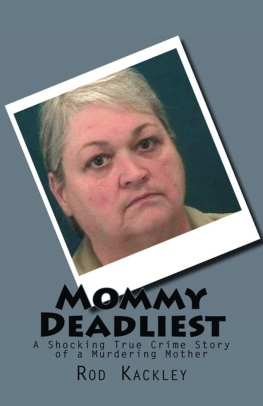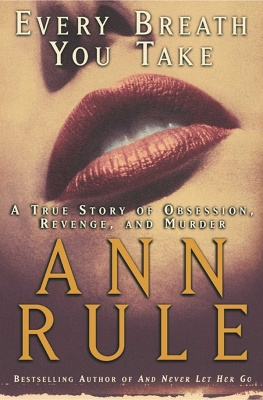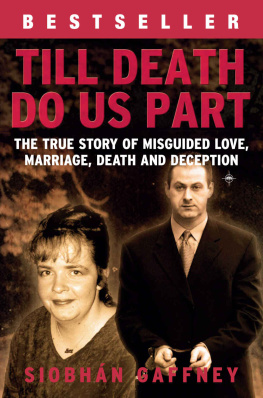
Kiss
of
Death
Kiss
of
Death
True Cases of
Fatal Attraction
Jean Ritchie

Michael OMara Books Limited
First published in Great Britain in 2020 by
Michael OMara Books Limited
9 Lion Yard
Tremadoc Road
London SW4 7NQ
Copyright Jean Ritchie 2020
All rights reserved. You may not copy, store, distribute, transmit, reproduce or otherwise make available this publication (or any part of it) in any form, or by any means (electronic, digital, optical, mechanical, photocopying, recording or otherwise), without the prior written permission of the publisher. Any person who does any unauthorized act in relation to this publication may be liable to criminal prosecution and civil claims for damages.
A CIP catalogue record for this book is available from the British Library.
ISBN: 978-1-78929-229-9 in paperback print format
ISBN: 978-1-78929-230-5 in ebook format
www.mombooks.com
Contents
List of Illustrations
EVERYONE FEARS DEATH AT THE HAND OF A STRANGER, THE FLASH of a knife in a dark alley, the deranged killer, the sadistic rapist who murders to conceal his crimes. But the truth is women are far more likely to be killed by their husbands, partners, lovers or ex-lovers than by a stranger. It is the person you know intimately who is the one who administers the lethal blow, the staged accident, the poison in the favourite meal or even hires a hitman. Murder is not only very rare, for women the most common form is domestic.
Men, too, are killed by their spouses, but for young men in particular death is more likely in a fight outside a pub or club than at the hands of a vengeful lover. That does not mean women dont kill: they do, and when they do it is most likely to be someone they have been involved with, romantically and sexually.
Jealousy, possessiveness, feelings of rejection, the need to get an ex-partner out of the way for financial reasons or to free the killer for a new life are the motives that impel crimes of passion. Love spawns some of the greatest higher feelings, but it also leads to the most debased acts of vengeance.
Theres nothing new about fatal attraction: history is full of murders primed by tortured jealousy. This book is a compilation of some of the most intriguing and shocking cases.
WHEN THE SMALL BLONDE WITH THE WIDE SMILE AND TWINKLING eyes walked into the pub, heads turned. More than one man who met her described the flirtatious Dena as a dead ringer for the Carry On star Barbara Windsor: cuddly, sexy, with a great sense of fun. She found it easy to attract men, and once hooked they were devoted to her. She in turn seemed to be devoted to them, giggling at their jokes, deferring, keeping her blue eyes fixed only on them. They walked out of the bar with their arms protectively round her shoulder, instantly head over heels in love with a woman who appeared to feel the same. They could not believe their luck.
But the really lucky ones were those who did not fall under the spell of Dena Thompson. The men who succumbed to her charms believed her string of implausible lies, blind to the fact she was defrauding them and would leave their lives in ruins. And when one of them began to suspect her unravelling fantasies, she killed him.
So did Dena have a bad start in life? Not at all. Life started uneventfully. She was raised in Hendon, north London, by her father, Michael, a former prison officer, and her mother, Margaret. She was good at gymnastics, left school with ten GCSEs and started work at the Halifax Building Society. She met her first husband, Lee Wyatt, an electrician, when she was twenty-two, on a blind date arranged by Lees cousin, Bob. They set up home in a modern three-bedroom house in Lancing, a seaside town in West Sussex, married in a register office on 12 October 1984, and their son Darren was born in 1987.
So far so normal, but Dena had dreams of making a fortune. She and Lee set up a business, Denalee Crafts, which made and distributed soft toys. Lee was the salesman while Dena, now at the Woolwich Building Society, doubled as a seamstress in the evenings and at weekends. Denas plan was to create a toy that would become a character in cartoon films, attracting lucrative franchising deals. The problem was as soon as she thought of something it became a reality to her, so when she and Lee dreamed up a cuddly, little leprechaun with a bushy, white beard, which they named Sean the Leprechaun, she was immediately telling everyone stories of the immense wealth their lucky leprechaun was providing.
Dena had a vivid imagination and the ability to convince those around her. She claimed to have had an approach from the Irish airline Aer Lingus, which wanted to give a Sean toy to every first-class passenger. There was no such approach. She claimed to have a multi-million-pound contract with the Disney Corporation in America, which wanted exclusive rights. There was no such contract. But Lee, who was completely in thrall to his wife, believed her. He also believed her when she said that the mafia were after him, as the front man of the business, because they wanted a substantial cut of the huge Disney contract. They had, she told him, set hired assassins on him. Her imagination fleshed out her lies: the assassins, she said, were a group known as The G-Men.
When the business went bust, Lee briefly worked at a hotel in nearby Brighton, but all the time living in fear of his life. It was at this time, when Denas dreams of a fortune were dashed, that she started defrauding her employers, the Woolwich Building Society. She set up an account under the name of Christina Duke and siphoned more than 26,000 into it from other accounts.
Before this came to light, the family moved in 1991 to Yapton village, 16 miles away, and closer to Denas job. With Lee still terrified and convinced that his wife and son were also in peril, Dena persuaded him that the safest thing for them all was for him to disappear. Amazingly, so in thrall to her was he that he did. He also believed her when she said theyd be even safer if they divorced, in order to confuse The G-Men, and she served papers on him just before he left home. He went on the run for the next three years, living as a vagrant, sometimes sleeping rough on park benches and even a bowling green. He changed his name and created a new identity, using the same method outlined in Frederick Forsyths bestselling novel The Day of the Jackal, and under the new persona of Colin Mitchell he found a job in an amusement arcade 300 miles away in Newquay, Cornwall.
The distance did not lessen the hold she had over him, and although colleagues at the arcade found him easy to get on with and sociable, he was phoning Dena when he could, and every time she strengthened his fears with stories of sinister encounters with The G-Men. Dena also hatched a plot to cover her fraud at the Woolwich; she dictated a series of letters to Lee, which he dutifully wrote and sent to her, worded as if he was threatening her and telling her he was on the run with the mythical Christina Duke, and demanding that Dena get them money. He also made phone calls, which she recorded, in which he threatened her. These calls, carefully scripted by Dena, were, she told him, to deflect heat from the assassins away from her and their son.
Lee was living very frugally in a flat above the amusement arcade, paying his wages directly into Denas bank account to help support her and Darren. What Lee did not realize, as he struggled with his lonely new life, still afraid that The G-Men would catch up with him, was that Dena, too, had a new life. He later said: She lives a life of lies and fantasy and I was the mug who went along with her lies. But he was far from the only mug.
Next page
